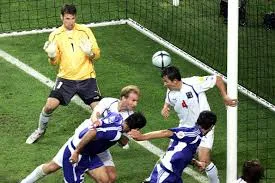
The phrase "next goal wins" is a familiar concept from schoolyard football, but for a brief moment in professional football history, FIFA introduced it as a rule to decide matches. This led to the Golden Goal and its lesser-known sibling, the Silver Goal. Let’s explore their origins, impacts, and eventual demise.
The Golden Goal
Introduced in 1993, the Golden Goal rule was simple: the first team to score during extra time won the match instantly. It aimed to replace penalty shootouts, which many viewed as a lottery, and to reduce the physical toll on players.
Memorable Golden Goal Moments:
Euro 1996 Final: Oliver Bierhoff’s decisive goal secured Germany’s victory over the Czech Republic.
Euro 2000 Final: David Trezeguet’s strike crowned France as champions.
1995 Auto Windscreens Shield Final: Paul Tait's winner for Birmingham City.
However, the rule had its issues. Teams became overly cautious, fearing a single mistake could end the game. Instead of encouraging attacking football, it often led to defensive play. Additionally, the unpredictable end time of matches created logistical challenges for stadium staff and police.
The Silver Goal
UEFA introduced the Silver Goal in 2003 to address the flaws of the Golden Goal. Under this rule, a goal scored in the first half of extra time allowed the opposing team to play until the end of the 15-minute period to equalize.
Notable Example:
Euro 2004 Semi-Final: Greece defeated the Czech Republic thanks to Traianos Dellas’ header in the 105th minute.
The Silver Goal offered a more balanced approach but faced similar criticisms. Many teams still played defensively, and the rule was seen as overly complex. Fans and players struggled to understand its nuances, and it didn’t significantly improve the excitement of extra time.
Why They Were Abandoned
Both rules were short-lived due to their inability to deliver on their promises. By 2004, FIFA and UEFA reverted to traditional extra time followed by penalties, acknowledging that while imperfect, this system provided the drama and fairness fans loved.